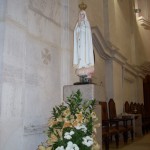Rather than update my already-long post from Wednesday, here’s another take on reasons why Catholics leave the Church. The Diocese of Trenton, New Jersey, has released the results of a survey of disaffected Catholics, and the reasons given for leaving–while no surprise–are interesting in the ways in which they overlap, and the ways in which they don’t, Rachel Held Evans’s list of reasons why evangelical Christians leave their churches and the Catholics Come Home organization’s list of reasons Catholics come back. According to the news story in the Star-Ledger,
Their reasons ranged from the personal (“the pastor who crowned himself king and looks down on all”) to the political (“eliminate the extreme conservative haranguing”) to the doctrinal (“don’t spend so much time on issues like homosexuality and birth control”). . . . In addition, they said, they didn’t like the church’s handling of the clergy sex abuse scandal and were upset that divorced and remarried Catholics are unwelcome at Mass.
I give Trenton Bishop David O’Connell major courage props for commissioning the survey, which he did in response to a suggestion by William Byron, SJ, in America last year, that bishops might learn a lot from “exit interviews” conducted with Catholics who leave. Bishop O’Connell not only took the dare, he gave Byron the job of exit interviewer. The study, conducted through Villanova University’s Center for the Study of Church Management and co-authored by Charles Zech, was presented yesterday at a conference on Lapsed Catholics at The Catholic University of America. The National Catholic Reporter interviewed Bishop O’Connell by email before running their story on the survey, and his comments add dimension to the Star-Ledger‘s coverage.
Bishop O’Connell cited his concern over Trenton’s declining October count (the average number of Catholics attending weekly Mass during the month of October, which most dioceses use as a typical month), a trend reflected in many US dioceses. What I liked hearing was the Trenton Diocese’s intention to use the results of the survey to guide outreach to the disaffected, as well as to improve communication of Church teachings and invite questions and conversations before people get fed up enough to leave. I also liked hearing that other dioceses are interested in carrying out similar exercises.
It would be easy for Church leaders to dismiss the gripes of those who’ve left as “incompetent, irrelevant, and immaterial,” as D.A. Hamilton Burger used to snort on the old Perry Mason show. Many will do that dismissing in the comboxes, I’m sure–based, if nothing else, on the fact that it was the Reporter that ran with this story first. It would also be easy for dioceses to assume they know the reasons why people are leaving, and base outreach efforts on those projections, or to design outreach to the disaffected on “entrance interviews” with converts who see all kinds of reasons to be in love with the Church. That’s a failing I find in the Catholics Come Home approach, sometimes. So I look forward to seeing how the “exit interviews” shape the future of Trenton’s efforts to refill the pews.
In the end, I was interested to see that the study authors named catechesis on the centrality of the Eucharist as a critical missing piece. Catholics Come Home named hunger for the Eucharist as the number one reason why lapsed Catholics return to the Church, and it was at the top of my reversion list, too. “If only 25 percent or less of our Catholics are participating in the Eucharist regularly, I think we have a serious concern,” Bishop O’Connell told the NCR. “We need to engage our Catholics in such a way that we see the Eucharist as . . . a necessary part of who we are in the Church.”
How will we do that? I say will, not can, because I’m convinced that unless and until we reignite a sense of Communion in the Body and Blood of Christ, people will find all kinds of reasons to leave the pews empty.











